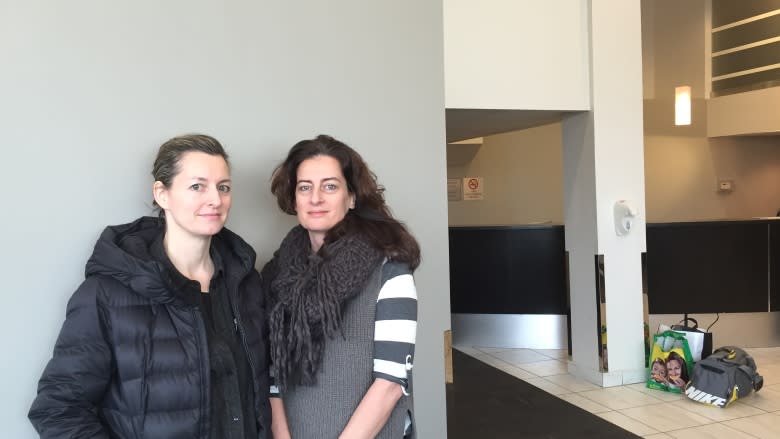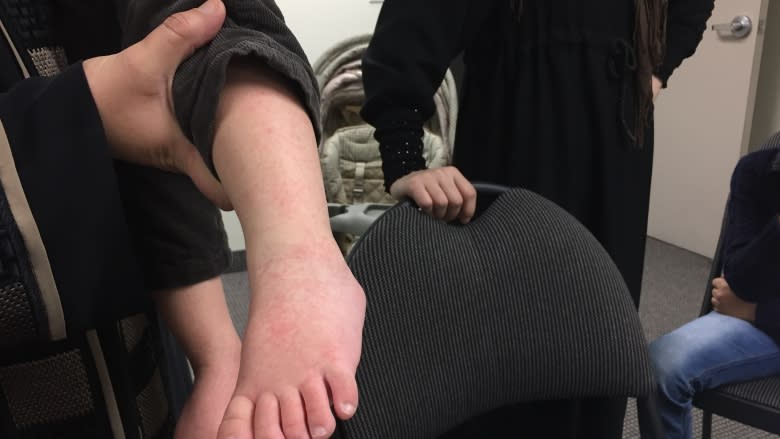Syrians feel 'hopeless' as government-sponsored refugees in Toronto, mother says
Some government-sponsored Syrian refugees staying at a budget hotel in Toronto say they feel like they're "trapped in a prison" without hope due to a lack of communication, supplies and assistance.
Virginia Johnson, one of two volunteers working at the hotel, joined CBC Radio's Metro Morning on Monday to speak to host Matt Galloway.
Johnson said the refugees have been at the hotel for weeks and have no idea when they will be able to leave. Some of the 85 government-sponsored refugees say they're not getting much help, and would rather go back to their refugee camps in Jordan and Lebanon.
"The settlement agencies are overwhelmed," said Johnson. "There's a huge opportunity for individuals to step up and help."
Zaneb Adri Abu-Rukti, a Syrian mother, spoke through a translator at the Toronto hotel, and said she did not expect to be there for so long.
"We were told that when we arrived to the hotel that we would only be staying for three to four days maximum. However, things have been changed and we've been here for 10 to 11 days, and we've been told it could be even longer. The problem is that we have kids and we would rather be outside in a settled house than sitting at a hotel," Abu-Rukti said.
"We feel like our kids are just stuck here. We go into one room, we eat, and then we return to other room and just go to bed. Our kids don't have anywhere to play, nowhere to go out. We feel like we're just trapped in a prison."
An email from Citizenship and Immigration Canada that was sent on behalf of spokesman Remi Lariviere said government-assisted refugees get "immediate access to essential services and social support" while in Canada and each family is unique.
"There is nothing unusual about a stay of several weeks in transitional accommodation ... Government-assisted refugees receive a one-time startup allowance plus monthly income support for their first year in Canada.
"Private sponsors will be fully occupied in addressing the needs of the persons they sponsor and who will be travelling to Canada in due course," the email said.
'2 classes of refugees'
However, Kate Bate, a Canadian who has been doing volunteer work, said some newcomers feel isolated.
"We're worried, first of all, that we're facing a major mental-health crisis if somebody doesn't start going in there and speaking to them every single day to find out if they are doing OK. For the past week and a half, and in one case there's a guy who's been there for a month, and no one has been talking to them," Bate said.
"We're very worried that what we are facing is, two classes of refugees. We've got this nurtured, loved, family supported by 35 families, and then we've got 100 families supported by one or two people," the volunteer said.
"It is the government's problem — but I don't think we blame the government for this. They wanted to bring people here, to get them out of harm's way as quickly as possible. And then the plan still has to be established, but as citizens of this country, we are responsible to also be part of that process, and it's a global citizenship issue."
Abu-Rukti added many of those who came with her were getting more help in Lebanon and Jordan.
"They used to provide for their families, but now they feel like they can't do that and they're hopeless."
'It must be very scary'
Johnson said people are struggling to address basic issues such as winter boots to go outside, for children who have never before experienced a Canadian winter.
Even something as simple as getting medical help for a young one who isn't feeling well is difficult for the newcomers, who are struggling to adapt to the new language, cold conditions and lack of support, she said.
Johnson said she had to help bring some children to Toronto's Hospital for Sick Children after a Syrian man approached her for help. It was later discovered the children were dealing with a bacterial infection.
"They're scared, it must be very scary," she said. "I don't expect them to feel gratitude immediately when they've come here — they're really so isolated … their kids are dying to go outside and play and they can't."
The volunteer said the difference between government and privately sponsored refugees is "vast," and the immigration minister should modify his approach.
"John McCallum needs to allow private sponsor groups to sponsor government-sponsored refugees," said Johnson. "To me, it would make sense to allow those government-sponsored refugees to be sponsored immediately."
For the Syrian mother, the isolation is taking a toll.
"I feel even though we chose to come out to Canada and it was something that we chose to do, it was our right and we chose it, however, it's not what we expected and it's not what we thought we would come into," said Abu-Rukti.
"Maybe this isn't where I should be. Another lady asked to return and the Canadian Embassy said: 'There is no way you guys can return now.'"



